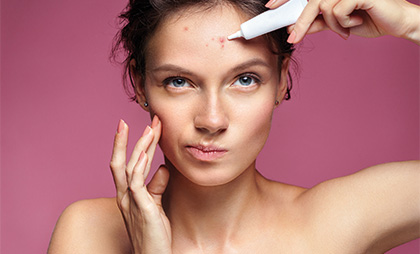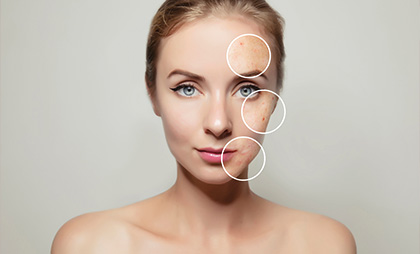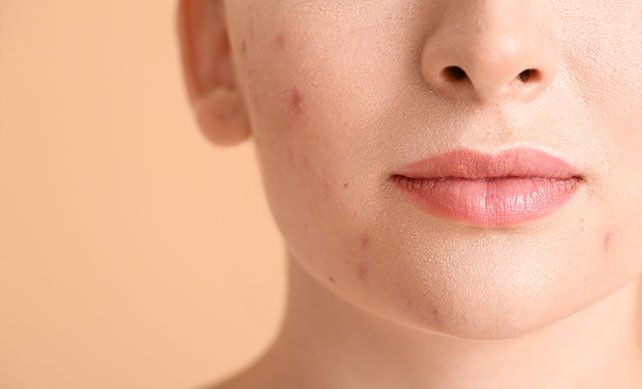Spot Treatment

HOW DO SKIN SPOTS OCCUR ON THE SKIN?
Skin spots, also known as pimples, blemishes, or acne, occur on the skin due to a combination of factors. These factors can lead to the development of spots:
- Excess oil (sebum) production: Sebaceous glands in the skin produce an oily substance called sebum. This helps lubricate and protect the skin. However, excessive sebum production can contribute to the formation of spots.
- Clogged hair follicles: Hair follicles are tiny pits in the skin where the hair grows. These follicles can become clogged with dead skin cells, oil (sebum), and other debris. When this occurs, spots can develop.
- Bacteria: Propionibacterium acnes (P. acnes) are naturally present on the skin. When hair follicles become clogged with oil and dead skin cells, P. acnes can multiply and cause inflammation, developing spots.
Hormonal changes: Hormonal fluctuations, particularly during puberty, menstruation, and pregnancy. They stimulate sebaceous glands to produce more sebum, contributing to the development of spots.
Genetics: A family history of acne can make an individual more susceptible to developing spots.
Diet: Some studies suggest certain dietary factors, such as consuming high-glycemic foods, dairy products, or diets high in refined sugars. All contribute to acne development.
Medications: Some medications, including corticosteroids, lithium, and certain hormonal medications, can cause or worsen acne.
Stress: Although stress does not directly cause spots, it can exacerbate the condition in some individuals.
It is important to note that spots are not caused by dirt or poor hygiene. Sometimes the excessive using of active ingredients can cause rashes, including skin spots. However, maintaining a consistent skincare routine is important, including;
- Gentle cleansing
- Avoiding excessive scrubbing
- Avoid skin irritating
These simple daily routines can help manage acne-prone skin. If spots persist or become severe, it is essential to consult with a dermatologist for appropriate treatment options. Another two factors that can lead directly to itchy skin spots are
- Being exposed to poison ivy plants
- And being exposed to contact dermatitis
Treating acne is considered an easy thing if you know the root causing it. Acne spot treatment work fast usually, and you can see their results fast like using;
- Pimple patch or drying lotion
- Hydrocortisone Cream
- Benzoyl Peroxide
- Salicylic Acid
Nevertheless, there will be a type of age spots or acne scars taking away your natural skin tone. These types of spots need “acne fighting” treatment techniques to wipe them off for good. Here are some of the best techniques used.



SPOT TREATMENTS
As skincare technology advances, so do the methods for treating various skin issues such as acne, pigmentation, and scarring. Three innovative and highly effective treatments, medical devices, Mesotherapy, and platelet-rich plasma , have emerged as leading spot treatment options.
- Medical Devices:
Medical devices used for spot treatments offer targeted solutions to skin issues. Scarlet X, Baby Face Beauty, and Cynosure Icon are some of the most popular medical devices. Each device uses different technology and technique to treat the spots on the skin.
- Mesotherapy:
Mesotherapy is a minimally invasive treatment. It involves injecting a customized cocktail of vitamins, enzymes, and other ingredients into the mesodermal layer of the skin. This treatment can address skin issues, including pigmentation, scarring, and acne.
- Platelet-Rich Plasma Therapy:
Platelet-rich plasma therapy and Vampire Facial treatment involve:
- Extracting a small amount of a patient’s blood.
- Separating the platelets.
- Injecting them back into the skin
Platelets contain growth factors that promote tissue renewal and stimulate collagen production, making platelet-rich plasma an effective treatment for various skin issues.
These three advanced skin spot treatment options; Medical devices, Mesotherapy, and platelet-rich plasma therapy. They can help address acne, pigmentation, scarring, and other skin concerns.
Combining these advanced treatments into your skincare routine allows you to achieve a clearer, healthier, and more radiant complexion. While each treatment has unique benefits, consulting with a dermatologist is essential to determine the most suitable option.
Skin spots can be life-threatening as they might indicate skin cancer or squamous cell carcinoma. Therefore, it is vital to see a dermatologist if you notice any itchy rash with changes in these spots’ color or size.



- Category
- MEDICAL COSMETIC


